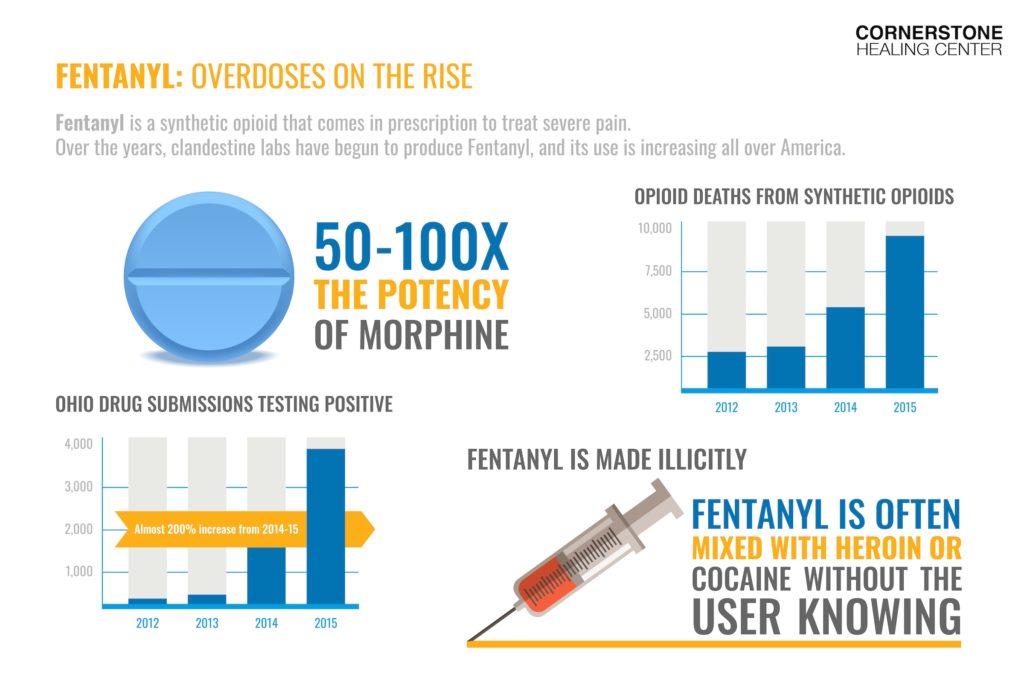Searching for help with drug and/or alcohol addiction? Call us now at (800) 643-2108.
The Truth About The Long-Term Use Of Fentanyl
Fentanyl is quite similar to morphine and is often used for medicinal purposes. The synthetic drug is given in low quantities to patients who are suffering from an extreme level of pain. The dependence on the drug usually begins from here.
Even though the drug is given in a controlled environment under professional supervision, once an individual enjoys the effects of the drug, they seek out more.
Fentanyl is also sold as a street drug which makes access relatively easy. It is used through smoking, injecting, or snorting, and in many cases, individuals tend to mix fentanyl with other substances to intensify the high.
What isn’t taken into consideration is the long-term effects of fentanyl. The drug poses many health threats, including permanent damage to the body or chronic illnesses.
Once the hit ends, the euphoric and pain-free feeling turns into nausea, headaches, and drowsiness. The pain the user initially tried to escape comes back with a more vigorous intensity than before.
In the long run, fentanyl affects the body in how it is used. Smoking or snorting the drug leads to chest pains and breathing problems. The drug travels from the lungs to the blood and causes distress to the body. When injected can lead to a lack of hormonal production, suppression of the immune system, and a greater risk of obtaining HIV/AIDS.
No matter how the drug is consumed, the side effects and long-term effects of fentanyl are bound to cause more significant disturbances in the body, mind, and life.
Fentanyl Causes Damage To Organs
The use of fentanyl through smoking, snorting, or injecting all leads to one main effect; euphoria. The drug reacts with the brain, which leads to this feeling of extreme pleasure. But how does the drug travel to the brain?
Fentanyl travels through to brain through the blood.
The drug dissolves in our blood and then travels throughout our body which is why one of the significant long-term effects of fentanyl include a weak heart and lungs. These organs are the two main components providing clean blood to the body.
The constant reaction of the drug leads to many changes in the brain. Users often start hallucinating, feeling depressed, anxious, confused, and developing mood disorders. In the long term, the brain stops producing and releasing endorphins (happy hormones) on its own, which results in the stated mental health issues.
A few of the side-effects of fentanyl use are;
- Constipation
- Nausea
- Vomiting
- Difficulty urinating
- Stomach pain and gas
- Gastrointestinal bleeding
Most of these are related to the digestive system. Hence, the many organs that are involved in the process of digestion get damaged horribly. These issues often lead to a lack of appetite, which worsens the problems, leads to a lack of nutritional intake, and can suppress the working of the immune system.
Drug abuse always has adverse effects, but long-term use of fentanyl affects every part of the body.

Fentanyl Causes Damage To The Brain
Fentanyl directly reacts with the brain, producing euphoric feelings and relaxing the body. Hence, the long-term effects of fentanyl are more evident through mental and behavioral disturbances.
Drug abuse leads to the lack of production and release of endorphins (happy hormones) and dopamine (reward hormones) in the brain. This means that users can no longer feel comfortable or content without the consumption of drugs.
Depression and anxiety are commonly observed because of stated reasons. Additionally, due to drug abuse, loved ones tend to abandon the user. The individuals suffering from substance abuse disorder also lose their job, start dealing with financial instability, and experience rageful fits if they do not get to experience the high.
These individuals are often found homeless, further adding to their mental health problems.
A fentanyl overdose can cause physical damage to the brain as well. In an overdose, the user’s breathing is slowed, decreasing oxygen traveling to the brain. The condition is called Hypoxia and can lead to coma, permanent brain damage, or death.
In another instance, people suffering from substance abuse disorder often experience seizures or a decrease in their cognitive abilities. This is again a result of a lack of oxygen to the brain and the depressant quality of the drug.
The seizures are caused by abnormal electrical activity or lack of in the user’s body, while the delay of cognitive abilities is due to the lack of hormone release and oxygen.
Injecting Fentanyl Can Lead To Infectious Disease
In medical settings, we often observe how meticulous medical staff is regarding injections. They ensure that the needle is replaced after every injection, and a sanitized needle is used. This eliminates the chances of diseases transferring from one individual to another and reduces infections.
One standard method of fentanyl consumption is through injecting. However, individuals who are doing so rarely take any precautionary techniques. The same needle is used on multiple individuals; even if it is not, it is seldom cleaned.
Through the everyday use of an intravenous object, the needle, many infections are transferred from one individual to another. The lack of hygiene also results in conditions that cause skin rashes, irritation, and inflammation at the site of injection.
There is also an increased chance of the individual suffering from tetanus through open wounds or spreading bacteria from needle to skin. Vein damage is often observed since the users do not know how to inject a needle properly or cannot do so because of the side effects of the drug. These are only the less severe side effects.
Long-term effects of fentanyl can lead to hepatitis C and B. It can also lead to HIV or AIDS. In most cases, these are common because of the lack of hygiene and sharing of needles. While plenty of treatments can help alleviate these diseases’ severe symptoms, there is no real cure.
Hence, individuals risk their health and possibly live for a few hours of euphoric rush.
Fentanyl Damages The Heart
Among many others, a side-effect of fentanyl usage is a decreased heart rate. A low rate also leads to low blood pressure, which calms the body and threatens the user’s life.
The long-term effect of fentanyl means that the low heart rate will remain consistent, which leads to a disease called Bradycardia. Bradycardia is the medical term for a painfully slow pulse. When a person suffers from Bradycardia, their heart cannot pump enough blood.
Fentanyl is a synthetic depressant which means that whenever consumed, it slows down the body’s processes, including the cardiac system.
With consistent use of fentanyl, the user’s body develops Q-T syndrome, a condition that slows down the electric conduction of the heart and disrupts the natural rhythm. This often happens with short-term use and can lead to more significant issues.
A long-term effect of fentanyl is the permanent change in the heart’s rhythm because of a lack of proper oxygen. This can damage the internal walls of the heart and can lead to bruising since the heart will have to put in double the amount of effort to keep the user alive.
Whether the drug is used for a short duration or extended, its effects are bound to cause permanent damage to the internal organs. The consistent struggle of the heart and its damage further impacts the regulatory systems in our body, which also leads to issues in the respiratory system and the brain.
Fentanyl Causes Damage To The Respiratory System
While under the influence of the drug, many individuals experience slowed breathing. They experience difficulty in breathing which can lead to breathing failure and death.
Fentanyl can be used through smoking as well. When inhaled, the drug and the smoke travel to the lung. The substance and nicotine attach to the lung wall linings, and since the drug is a depressant, it slows down the working rate of the lungs.
The residue of the drug keeps adding layers to the lungs throughout usage. These often lead to a consistent difficulty in breathing, slows the breathing rate, and make it difficult to provide oxygen for the rest of the body.
Since the lungs clean the oxygen provided to the heart, the use of fentanyl also causes a hindrance in that process. This leads to heart congestion and Bradycardia, as discussed above.
Perhaps the most dangerous side-effect of smoking fentanyl is alveolar hemorrhage. This disease is the result of damage to the alveoli of the lungs. The build-up of drug residue and depressant qualities often causes irreparable damage, leading to respiratory failure.
All of these symptoms are even worse for individuals who have allergies, asthma, or have suffered from lung diseases before. Individuals often experience a recurrence of tuberculosis before the damage leads to a more significant lung disease or collapse.
Similarly, when fentanyl is snorted, it travels through the nose to the lungs, causing even more significant damage to the airways. There is a lot of bruising and wounds on the inside of the nose, the airways, and the lungs.

Fentanyl Use Can Cause Psychosis
Fentanyl use can cause a lot of damage to the brain. From the release of hormones to mishaps in electrical signals, a user is bound to develop mental illnesses.
A common symptom of drug abuse is depression and anxiety, which we also observe in fentanyl users. However, fentanyl also causes the user to hallucinate.
Hallucinations are a rare side-effect, but those suffering from them can experience extreme auditory and visual hallucinations. Hearing voices, music, clapping, or random sounds are the most common hallucinations that users experience.
In rarer cases, individuals also claim to have heard voices asking them to commit self-hatred crimes or hurt others. However, that is something that only happens because of the preexisting desires of the user.
Fentanyl causes a lot of confusion in the user, leading to paranoia. This can further result in harmful behaviors toward themselves or others.
We discussed before how a long-term effect of fentanyl includes an electric shortage in the brain. This distress to the brain can cause seizures, but in more users, it is observed that they can cause repetitive motor activity. The individual might be experiencing paranoia and hallucinations that will make them feel obligated to repeat specific actions and continue to do them “correctly.”
They might also be repeating behaviors because of the electric issues in their brain, which might be involuntarily moving their hands or legs or turning on a switch repeatedly.
The many evident and observable symptoms make it easy to identify a fentanyl addiction and can help loved ones provide treatment timely.
Fentanyl Overall Long-Term Effects On Your Life
Besides the many physical and mental side effects of fentanyl abuse, it can also upset your life in many other ways.
For starters, it can cause irreparable damage to the organs in your body. It can cause chronic diseases and mental health issues that require constant care and treatments and affect your life’s smooth running.
Some recurring issues are;
- Health Problems: Drug abuse of any sort causes a considerable hindrance in personal life as well. People who depend on or love you will often become tired of constantly taking care of you and ensuring your health while you continue sabotaging their efforts.
- Relationship Problems: Children, spouses, friends, and relatives become distant or cut themselves off because of the behavior that your drug abuse is forcing you to adopt. People rarely want to suffer the consequences of someone else’s actions, despite their high dependence on drugs.
- Loss Of Finances: Fentanyl abusers lose their job and become financially inept quite quickly. They are incapable of maintaining a routine in life, fulfilling their work obligations, and running out of savings because of their over-expenditure on fentanyl.
- Homelessness And Crime: Financial issues can also lead to homelessness or committing crimes. Individuals suffering from a substance abuse disorder will often find it difficult for them to be able to resist drugs. They will do anything to ensure that their next hit is available.
Moreover, without structure and purpose in life, people lose their self-identity. It is so commonly observed in individuals suffering from substance abuse disorders.
Fentanyl Can Cause Overdose And Multiple Organ Damage
Long-term effects of fentanyl usage can cause organ damage and overdose. When used for recreational purposes, overdose chances become much more significant.
Some signs of overdose are;
- Limp body
- Loss of consciousness
- Bluish lips and nails
- Cold hands
- Slowed breathing
- Vomiting
- Coma
It is essential to ensure that an individual overdosing on fentanyl is immediately given medical assistance since the lack of oxygen and slowed heart rate can cause a quick decline in their health or even death.
Death due to fentanyl overdose is quite common. In 2019 alone, roughly 36,000 deaths in the US were due to overdosing on opioids.
Besides death from overdose, diseases caused due to damage to bodily organs- heart diseases, lung diseases, HIV, AIDS- can also lead to a failure in treatment and cause death.
Some people suffering from substance abuse disorder go to rehab or get the appropriate treatment. However, the damage that the fentanyl was supposed to cause to the body has already been done. But the individuals still face the side effects of embracing death because of their previous usage.
How To Get Help For Fentanyl Addiction
Substance abuse disorders only worsen with time and continue to ruin the user’s physical and mental health and life. Getting treatment is extremely important to reduce the chance of overdose and death for the individual. It is essential to give them another chance at life.
Addiction treatments are not just about how you are supposed to overcome your addiction but also include a lot of therapy to overcome the underlying cause of addiction. Medical practitioners will also treat any physical disease resulting from fentanyl use during addiction treatment.
While the treatment process will only take a few months, it will change the user’s perspective and approach to life, resulting in many great benefits for them. They learn how to adopt and maintain healthy habits, repair broken relationships, control their triggers, and take care of themselves independently but ask for help when needed.
Many individuals often end up losing their self-identity due to drug abuse. Treatment and rehab open an excellent opportunity to discover who they are and what they like and develop goals for their future self.
Cornerstone Healing Center is an ideal rehab that tackles the issue from multiple aspects if you or your loved ones suffer from such a disorder. Whether it is physical health, mental health, relationship problems, or life skills, we have a team of highly qualified medical practitioners who ensure you get the best treatment possible.
Contact us today to live a fulfilling life.







